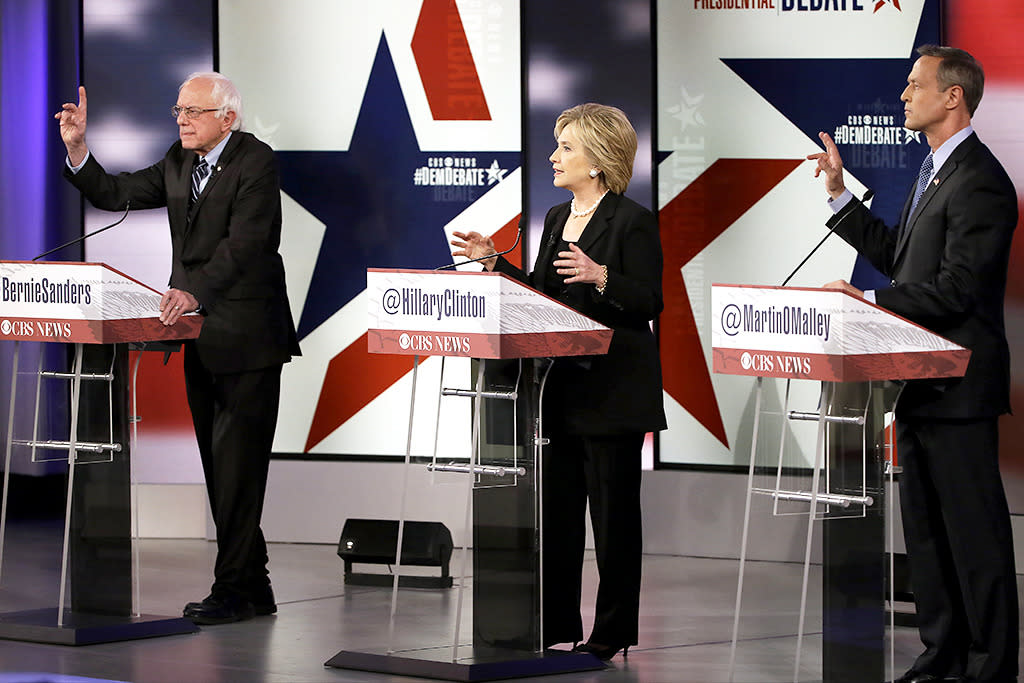A Democratic Debate In The Shadow Of Terrorist Attacks

The Democratic debate on Saturday night was held under the shadow of the terrorist attacks in France. It began with a moment of silence in a demonstration of respect and sorrow for the victims. And the first 35 minutes of the two-hour Des Moines, Iowa session were devoted to questions about international security and the fight against terrorism. After that, all bets were off, with lively exchanges between Hillary Clinton, Bernie Sanders, and Martin O’Malley on immigration and Wall Street reform, the minimum wage, and gun control.
The debate yielded no shortage of pugnacious lines. Sanders declared that “the business model of Wall Street is fraud.” Looking over at the opposing party, O’Malley referred to “that immigrant-bashing carnival barker, Donald Trump.”
The debate was co-sponsored by Twitter, and each of the candidates’ Twitter handles was emblazoned in the front of their podiums. Although the moderating panel led by Face The Nation’s John Dickerson was certainly less self-aggrandizing than the disastrous CNBC Republican debate panel, it was not without a certain discernible agenda. In the opening half-hour, Dickerson posed nearly all his questions as criticisms of Clinton, asking Clinton to defend herself, and basically baiting the other two to attack her.
There was also far too much time spent by Dickerson trying to get the trio to use the specific term “radical Islam” to condemn terrorists. “Softness of language betrays a softness of approach. If you don’t call it what it is, how can your approach be effective to the cause? That’s the critique.” It was, in theory, a valid question in the sense that it’s one that will be posed to the Democratic candidate by her or his Republican opponent in the general election. But in practice this night, asked over and over within a few minutes, Dickerson’s question ended up a matter of highly-charged semantics, and an instance of carrying water for the most conservative critics in the media and in the current line-up of Republican candidates. No wonder Mike Huckabee, for one, was merrily tweeting throughout the proceedings.
More embarrassing for CBS was the final segment of the night, when Major Garrett (“in Spin Alley,” said Dickerson, a neighborhood no viewer was likely ever to have visited) recapped the “most talked-about moments” on Twitter. He ticked off three, one for each: When Clinton “defended her integrity on campaign contributions and mentioned that 60% of her donors are women”; when “Sanders called Dwight D. Eisenhower a noted socialist referring to his income tax brackets being very much higher”; and O’Malley’s Trump line. But CBS made the mistake of letting Garrett’s audio to be heard by the three candidates as they stayed onstage, post-debate, and there was much laughter from the audience — and a little mugging from the candidates — as their “winning” lines were quoted back. Two hours of debate were thus boiled down to spikes in Twitter engagement: How belittling.
The section devoted to banking and Wall Street was probably the most heated segment of the evening, with Sanders accusing Clinton of being in political debt to Wall Street donors. Clinton said sharply that Sanders was trying to “impugn my integrity,” a whiplash that Sanders flinched beneath, thereafter prefacing many of his criticisms of both of the other candidates with “With all due respect…”
CBS preceded the debate with a 48 Hours special titled Paris Under Attack. Anchored by CBS This Morning co-host Norah O’Donnell, the hour did a good job of summarizing what was known about the terrorist attacks as of broadcast airtime. It also served, in some tiny degree, to redeem the thoroughly junkified version of “news” as usually presented by the true-crime-pandering 48 Hours brand.


